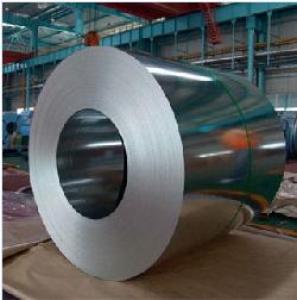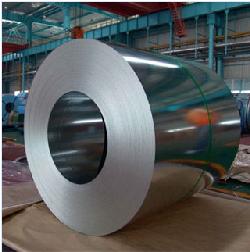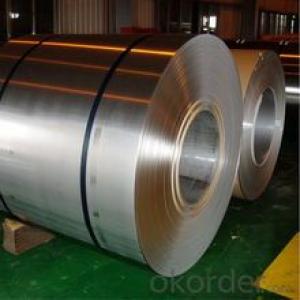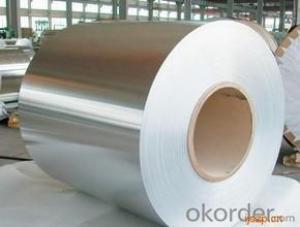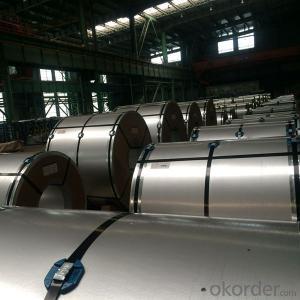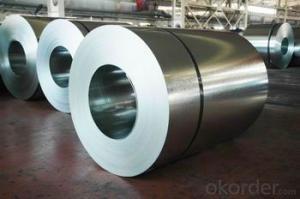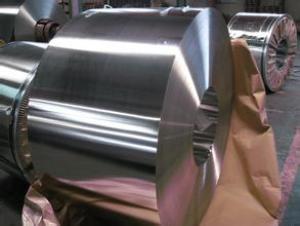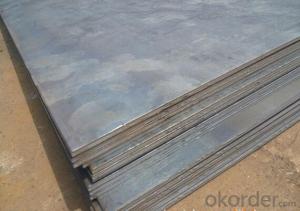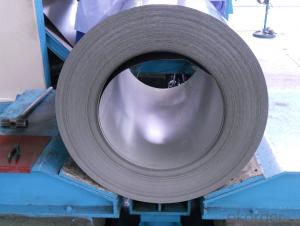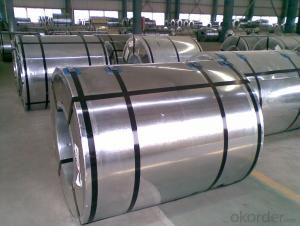Hot Dipped Galvanized Steel Sheet in Coil Z100
- Loading Port:
- China Main Port
- Payment Terms:
- TT OR LC
- Min Order Qty:
- -
- Supply Capability:
- -
OKorder Service Pledge
Quality Product, Order Online Tracking, Timely Delivery
OKorder Financial Service
Credit Rating, Credit Services, Credit Purchasing
You Might Also Like
Quick Details
| Standard: | ASTM,BS,DIN,JIS | Grade: | CS-B,SS255-SS550 | Thickness: | 0.13-4.0mm |
| Place of Origin: | Hebei China (Mainland) | Brand Name: | HBIS tangsteel;zhongguan,WISCO | Model Number: | simco13 |
| Type: | Steel Plate | Technique: | Cold Rolled | Surface Treatment: | Galvanized |
| Application: | roofing,home appliances | Special Use: | High-strength Steel Plate | Width: | 600-1524mm |
| Length: | 1000-4000MM | Coil Weight: | 4-8MT | Chemical Treatment: | Chromated(Cr 3+,6+,0+) |
| Surface: | Skin pass/non skin pass | Oil: | Slight Oiled/Dry | Spangle: | Regular/Zero/Big |
| Zinc Coating: | Z40-Z300 |
Packaging & Delivery
| Packaging Detail: | export standard: plastic film +water proof paper + steel plate+ packing steel strip |
| Delivery Detail: | about 25 days after a firm order |
Specifications
Hot Dipped Galvanized Steel Sheet in Coil
MOQ: 50MT/size and 100MT/order
Payment term: LC/TT
FOB ST Tianjin: 800/mt
- Q: I found this amazing kid on youtube - is he using nylon or steel strings?(I'm buying my first guitar! helpp)oh and is fingerstyle also possible in steel string guitar? does it hurt?(I might sound really stupid-..)thanks a lot
- Once you LEARN how to play a guitar.. you will know just how stupid that question sounded. CLASSICAL guitars use NYLON STRINGS and ACOUSTIC guitars use STEEL STRINGS and either type of string will make your fingers sore until you get some ca louses on them
- Q: How are steel coils used in the manufacturing of household goods?
- Household goods rely on steel coils for their manufacturing, utilizing them in various ways. One notable application is in the creation of appliances like refrigerators, washing machines, and ovens. These coils are skillfully molded and formed into different parts and components, fortifying the final product with durability and robustness. Moreover, furniture manufacturing frequently incorporates steel coils, specifically in constructing metal frames for chairs, tables, and bed frames. The coils can be bent, welded, or molded to desired specifications, providing a solid and dependable foundation for these essential household items. Additionally, steel coils find utility in the production of kitchen utensils and cookware. These coils can be expertly stamped or pressed into diverse shapes, including pots, pans, and cutlery. Consequently, this process generates long-lasting and heat-resistant products that are indispensable for everyday cooking and food preparation. In essence, steel coils assume a critical role in the manufacturing of household goods, imparting strength, durability, and adaptability to a wide array of products.
- Q: What are the different coil slitting line configurations used for steel coils?
- Manufacturers have a range of options when it comes to coil slitting line configurations for steel coils. Each configuration has its own advantages and applications. These configurations are as follows: 1. Simplex Slitting Line: This configuration is suitable for lower production volumes and thinner gauge materials. It utilizes a single slitter head to cut the coil into smaller widths. 2. Loop Slitting Line: Ideal for high-volume production and thicker gauge materials, this configuration features a loop pit that allows for continuous processing without stopping the line. 3. Double Loop Slitting Line: Similar to the loop slitting line, this configuration includes two loop pits, enhancing the line's efficiency and productivity. It is commonly used for processing wider width and thicker gauge materials. 4. Tension Stand Slitting Line: With a tension stand that applies constant tension during the slitting process, this configuration ensures consistent slit widths. It is often used for high-precision slitting applications. 5. Rotary Shear Slitting Line: This configuration utilizes a rotary shear to cut the steel coil into smaller widths. It is suitable for both thin and thick gauges and offers high-speed and accurate cutting. 6. Scrap Winder Slitting Line: This configuration incorporates a scrap winder to collect excess material trimmed during the slitting process. It helps improve efficiency and reduces waste. 7. Combination Slitting Line: Combining multiple slitting processes into a single line, this configuration allows for different slitting methods and widths to be achieved within one setup. It provides flexibility and versatility in processing various steel coil sizes and materials. Manufacturers can choose from these different coil slitting line configurations based on their specific production requirements and the properties of the steel coils they are processing.
- Q: What is the maximum diameter of a steel coil?
- The maximum diameter of a steel coil can vary depending on multiple factors such as the type of steel, coil weight, and the specific dimensions required by the manufacturer. However, in general, steel coils can range in maximum diameter from a few feet to several meters.
- Q: Aluminum alloy rolling doors and color steel shutter door that good
- Hello, the shutter door material mainly galvanized steel plate, color steel plate, aluminum alloy, stainless steel, PVC soft board, PVC soft door curtain.
- Q: How are steel coils inspected for width variations?
- Steel coils are typically inspected for width variations using non-contact laser measurement systems. These systems use lasers to scan the entire surface of the coil and measure the distance between the coil edges at regular intervals. This data is then analyzed to detect any variations in width, allowing for timely adjustments and ensuring the desired specifications are met.
- Q: I would like to build steel galvanization plant.
- That's depending on what type of metal you want to cover the steel parts in the galvanization process. The galvanization in words refers only to that kind of process which is using electric deposition of a metal through a bath of a electrolyte from a plate containing pure metal needing to be deposed on steel tide at the anode electrode or + polarity and at the other side (other electrode, cathode or - polarity). There needs to be a certain recipe of mixed salts for creating very tight and uniform growth crystals, for not being corroded or leafed away with time. There are certain salts which provide this king of growing in the same time with the polished look of the piece galvanized. This salts can be dissolved in water, for creating the electrolyte or being melt (which is not so safe technique) and used and kept like that. The dipping is no so used any more and it can not be called galvanization. More recent techniques use hot plasma blowers, meaning a torch with plasma and a wire of the specific metal to be deposited being melt in the plasma and blown to the surface of the steel part. Anything you'll do you have to deal with the local Environmental Agencies and with the tap water supply/ sewerage administrator, because you;ll have to make a contract with them for you to show that you retain the hard metals from the water dropped to sewerage, if any. Dfriend:)
- Q: Question about steel type used in bridges.?
- It is used for other things besides bridges and that might be a bad use. Corten was used for very tall light standards in the Fort Worth Water Gardens with the clear understanding that it was to be kept dry. As time passed and personnel changed, somebody decided the round base with bolts sticking up was ugly and put dirt and plantings in the basin in the concrete holding the poles. The watering of the plants kept the rust going through the steel and one pole eventually fell, killing two people. The other light poles were removed.
- Q: Are steel coils used in the oil and gas industry?
- Yes, steel coils are commonly used in the oil and gas industry for various applications such as pipeline construction, storage tanks, and drilling equipment. The strength, durability, and corrosion resistance of steel make it an ideal material for handling the demanding conditions in this industry.
- Q: What are chemical properties of high speed steel? Physical properties?What is high speed steel used for? One interesting fact about high speed steel?
- wikipedia: High speed steel (often abbreviated HSS, sometimes HS) is a material usually used in the manufacture of machine tool bits and other cutters. It is often used in power saw blades and drill bits. It is superior to the older high carbon steel tools used extensively through the 1940s in that it can withstand higher temperatures without losing its temper (hardness). This property allows HSS to cut faster than high carbon steel, hence the name high speed steel. At room temperature, in their generally recommended heat treatment, HSS grades generally display high hardness (above HRC60) and a high abrasion resistance (generally linked to tungsten content often used in HSS) compared to common carbon and tool steels. see reference for more info .
Send your message to us
Hot Dipped Galvanized Steel Sheet in Coil Z100
- Loading Port:
- China Main Port
- Payment Terms:
- TT OR LC
- Min Order Qty:
- -
- Supply Capability:
- -
OKorder Service Pledge
Quality Product, Order Online Tracking, Timely Delivery
OKorder Financial Service
Credit Rating, Credit Services, Credit Purchasing
Similar products
Hot products
Hot Searches
Related keywords
